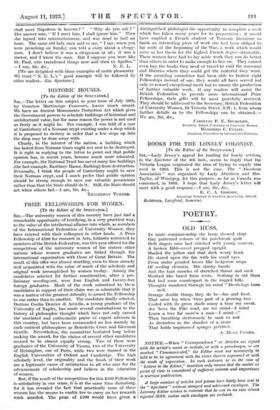PRIZE FELLOWSHIPS FOR WOMEN.
[To the Editor of the SPECTATOR.] Sm,—The university women of this country have just had a remarkable opportunity of testifying, in a very practical way, to the value of the intellectual alliance into which, as members of the International Federation of University Women, they have entered with their colleagues in other lands. A Prize Fellowship of £100 for research in Arts, hitherto restricted to members of the British Federation, was this year offered for the competition of the university women of the sixteen other nations whose women graduates are linked through the international organization with those of Great Britain. The result of this offer was almost startling, even to those already well acquainted with the value of much of the scholarly and original work accomplished by women to-day. Among the candidates selected for further consideration, after a pre- liminary weeding-out, were four English and twenty-five foreign graduates. Much of the work submitted by these candidates in support of their claim was so admirable that it was a matter of the greatest difficulty to award the Fellowship to one rather than to another. The candidate finally selected, Dottore Cecilia Dentice di Aceadia, a young graduate of the University of Naples, has made several contributions to the history of philosophic thought which have not only earned the unstinted and enthusiastic praise of expert advisers in this country, but have been commended no less warmly by such eminent philosophers as Benedetto Croce and Giovanni Gentile. Nevertheless, the committee hesitated long before making the award, for the claims of several other candidates seemed to be almost equally strong. Two of these were graduates of the University of Vienna, two of the University of Helsingfors, one of Paris, while two were trained in the English Universities of Oxford and Cambridge. The high scholarly level, the originality and the finish of their work are a legitimate cause of satisfaction to all who care for the advancement of scholarship and believe in the education of women.
But, if the result of the competition for this £100 Fellowship is satisfactory in one sense, it is at the same time disturbing, for it has revealed the fact that practically none of these women has the means to enable her to carry on her research work unaided. The prize of £100 would have given a
distinguished philologist the opportunity to complete a work which has taken many years for its preparation ; it would have enabled a French student of Teutonic literature to finish an interesting piece of work she had been obliged to lay aside at the beginning of the War, a work which would serve as her thesis for the highest French degree obtainable. These women have had to lay aside work they can do better than others in order to make enough to live on. They cannot even buy the books they need or travel to visit the museums and libraries where they could get the material they want. If the awarding committee had been able to bestow eight Fellowships instead of one, they would all have served not only to reward exceptional merit but to ensure the production of further valuable work. If any readers will assist the British Federation to provide more international Prize Fellowships, their gifts will be most gratefully received. They should be addressed to the Secretary, British Federation of University Women, 92 Victoria Street, S.W. 1, from whom further details as to the Fellowships can be obtained.— We are, Sir, &c., CAnousrr. F. E. SPURCEON,
President, British Federation of University Women. WINIFRED C. COLLIS,
Chairman, Conunittec on International Relations.


































 Previous page
Previous page